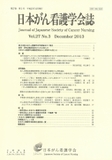Japanese
English
- 販売していません
- Abstract 文献概要
- 参考文献 Reference
- サイト内被引用 Cited by
要旨
本研究の目的は,ギアチェンジ後に一般病棟に転院したがん患者のターミナルケアを行う看護師のジレンマと対処方法を明らかにすることである.ギアチェンジ後に大学病院から転院したがん患者のターミナルケアを行う一般病棟の看護師11名に半構成的面接を行い,内容分析を行った.
分析の結果,看護師のジレンマは,【医療者と患者の間でのギアチェンジへの認識の相違がある】【理解力がある患者に家族の希望で真実が伝えられない】など6カテゴリーが抽出された.看護師のジレンマへの対処方法は,【相談やかかわりの中で自分の気持ちに対処する】【忘れることやあきらめで自分の気持ちに対処する】【チームでケアができるよう調整を行う】など7カテゴリーが抽出された.
本研究より,ギアチェンジ後に一般病棟へ転院したがん患者のターミナルケアを行う看護師のジレンマの背景には,医療者と患者の間でのギアチェンジへの認識の相違があった.そして,患者・家族・医療者がターミナル期の共通の目標をもつことができないために看護師のジレンマが起きていることが明らかになった.その背景には,現状についての不十分な認識から,患者・家族の心理が揺れ動いていることが考えられた.ジレンマに対処するためには,患者・医師・看護師間での情報共有のための調整と,患者が主体的に症状緩和に取り組めるような支援が必要であると考えた.
Abstract
The study objective was to determine dilemmas of nurses when providing terminal care to cancer patients who had been moved to a general ward after the so-called 'gear change(' switch from positive treatment to mainly palliative care)and methods used for coping with such situations. We conducted semi-structured interviews with 11 nurses providing terminal care to cancer patients transferred to a general ward from university hospital after the gear change, and analyzed the results.
Six categories were extracted from dilemmas of the nurse. These categories included items such as "there are differences in the perception of the gear change between the medical staff and patients" and "we cannot tell the truth to some patients despite their ability to understand, because their families request that we not tell them." Seven categories were extracted from the nurses' methods for coping with these dilemmas. These categories included items such as "coping with their own feelings through consultation and interaction", "coping with their own feelings by forgetting or giving up", and "adjusting the situation so that care is given as a team".
This study revealed that nurses providing terminal care to cancer patients who had been moved to a general ward after the gear change experienced dilemmas when there was a gap in perception of the gear change between medical staff and patients. We found that the dilemmas of these nurses arose because the patients, their families, and medical staff did not share a common goal during the terminal period. Psychological fluctuations of patients and their families due to insufficient perception of their present conditions may underlie this situation. We conclude that in order to cope with these dilemmas, nurses need to coordinate work to facilitate information sharing among patients, doctors and nurses, and support patients in making autonomous efforts to palliate symptoms.
Copyright © 2013, Japanese Society of Cancer Nursing All rights reserved.


